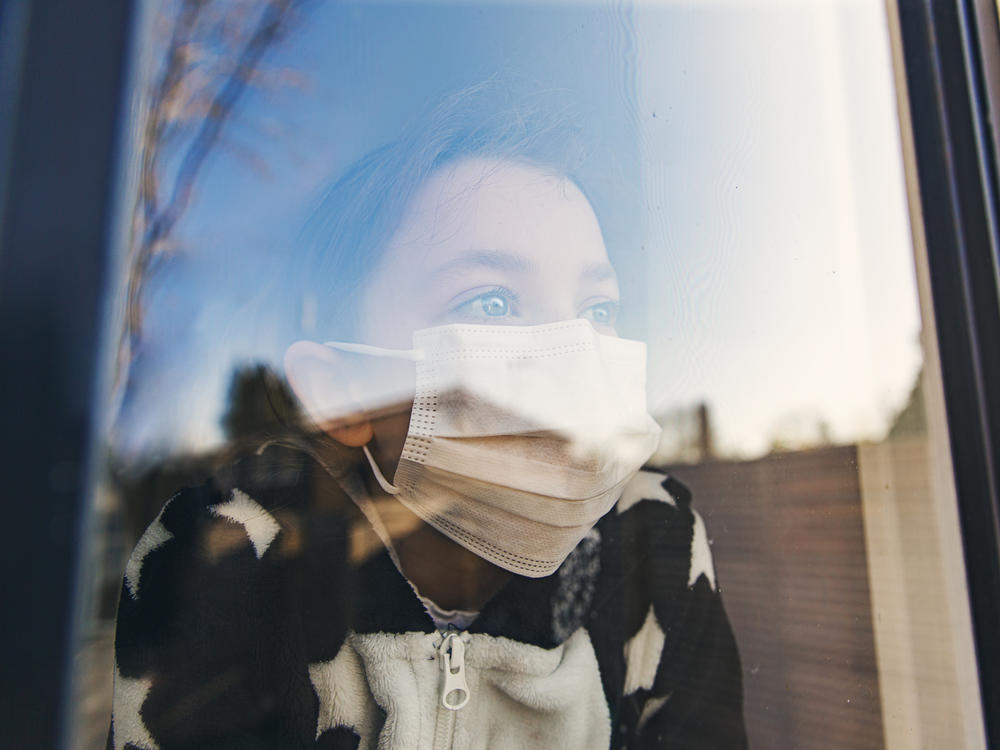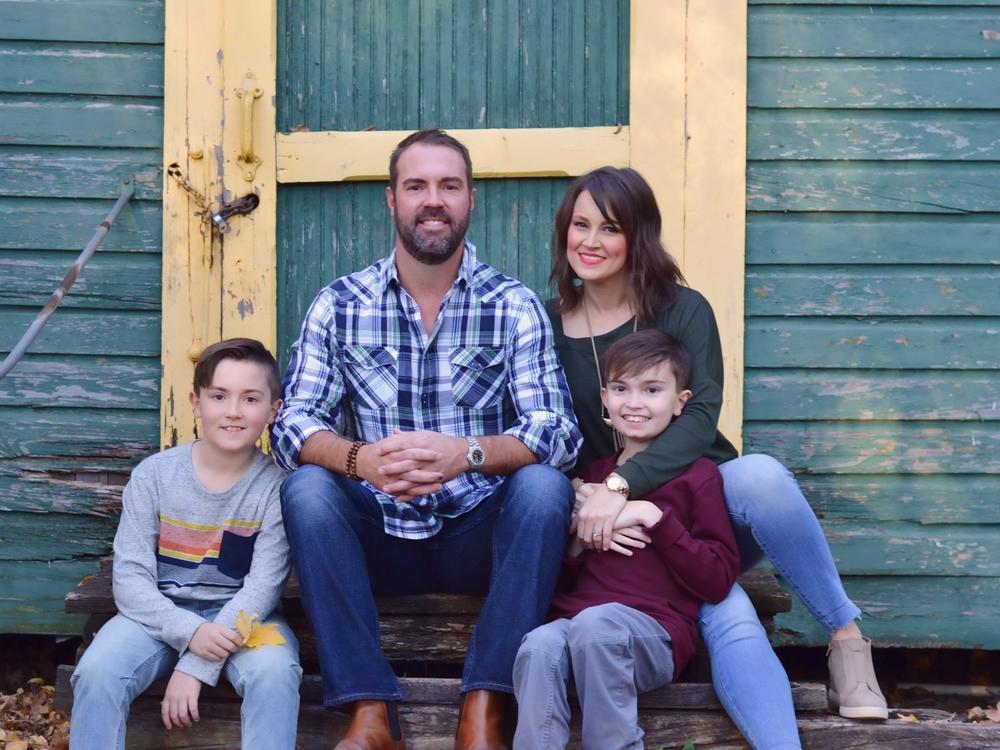Section Branding
Header Content
Parents Of Children With Disabilities Join The Legal Battle Over Masks In Schools
Primary Content
Brittany Schwaigert says her 13-year-old son, Greyson, needs his peers to wear their masks.
Greyson has tuberous sclerosis complex, a rare genetic disorder, which means contracting COVID-19 could send him into renal failure among other complications. He is also behind in school due to developmental delays.
"He doesn't understand that he's in danger and so therefore he doesn't understand he has to [put on a] mask." Schwaigert says. "Those kinds of advanced concepts are out of his grasp. So, it requires everyone around him to protect him."
He attends school at Collierville Municipal School District in Tennessee. In mid-August, Tennessee Gov. Bill Lee, a Republican, issued an executive order that allows parents to opt their children out of mask mandates.
As of Aug. 20, 16% of students in Greyson's district were opting out. Schwaigert is a lead plaintiff in a class action lawsuit challenging the governor's opt-out policy. On Friday, a federal judge temporarily blocked Lee's order from being enforced, but that ruling only lasts until Sept. 17.
Schwaigert says Greyson can only get the special education services and socialization he needs in the classroom. But the opt-out order, she adds, would put her son in danger when he is at school. "We cannot rely on other people's parenting to protect our special needs child. That's absurd."
In a wave of lawsuits in nearly half a dozen states, families of students with disabilities are joining the legal battle over masks in schools. Complaints filed in Tennessee, Florida, Utah, Texas and South Carolina argue that restrictions on mask mandates infringe on disability rights and that children with disabilities are being forced to choose between their health and their education.
"We hear all the time, 'Oh, only kids with preexisting conditions are the ones that get sick and die,' " Schwaigert says. "Well, that's my kid. That is my child. He has a lot of preexisting conditions, and he matters."
The U.S. Department of Education has also said restrictions on mask mandates may be discriminatory against students with disabilities. On Aug. 30, the department's Office for Civil Rights announced it is investigating mask mandate restrictions in five states, including in Tennessee, Utah and South Carolina.
A choice between safety and education
With restrictions on mask mandates in place, disability rights advocates are arguing that students with disabilities are putting their lives at risk to attend school.
Parents must "make the impossible decision of deciding whether to pull their children out of in-person learning or risk severe reactions or death as a result of COVID-19," the complaint in Tennessee says.
The suits aren't demanding that schools institute a mask mandate. Instead, parents such as Schwaigert want schools to have the capacity to require masks on the basis of regional health metrics.
"Gov. Lee doesn't take into account that not all children are going to survive this decision," Schwaigert says. "He's making a broad strokes decision for every child in Tennessee."
Lee's office did not respond to NPR's request for comment.
The federal Americans with Disabilities Act and Section 504 of the Rehabilitation Act guarantee that children with disabilities have access to an inclusive public education. They also require schools to provide "reasonable accommodations" to help make that education accessible — and the complaints argue those accommodations can include masks for everyone.
A Florida lawsuit was the first to argue that Republican Gov. Ron DeSantis' mask mandate ban is in violation of federal disability rights law. Matthew Dietz, one of the lawyers who filed that lawsuit, says mask mandates meet the benchmarks for a reasonable, necessary accommodation.
"If they don't get that mask when they go to school, they're at higher risk of death. So yes, it's necessary," Dietz says. "Is it reasonable? It's a piece of cloth, it's not difficult. Would it cause a fundamental alteration or an undue burden to the school system as a total? Not at all."
Dietz adds that it's just as reasonable as accommodating peanut allergies, which schools have been doing for years.
In a separate lawsuit, a Florida judge has already ruled that DeSantis cannot enforce a ban on mask mandates. Nonetheless, the governor is withholding money from two school districts that are requiring face coverings.
A spokesperson for DeSantis, who is named in Dietz's suit, told NPR, "The assertion that forced-masking all children ages 2 and up has any impact on school safety vis-a-vis COVID-19 is not data-driven and is not reflective of a scientific consensus."
In fact, several studies have shown that universal masking in schools can reduce the spread of the virus. The Centers for Disease Control and Prevention recommends indoor masking for everyone in schools, regardless of vaccination status, with the exception of children younger than 2 years old.
A court hearing for Dietz's lawsuit over federal disability rights is set for Wednesday.
Running out of time
The legal battles over masks come as millions of children are heading back to school.
In addition to launching civil rights investigations in states that ban mask mandates, the Education Department has thrown its support behind school administrators who choose to ignore those bans. But even then, Dietz says, the federal government has been slow to act.
"There's no time for investigation," he says. "By the time they do investigations, we're going to have dead children."
In Utah, parents are challenging Republican Gov. Spencer Cox over the mask mandate ban in state court, rather than in federal court. Greg Skordas, an attorney on the case, says that with schools starting and children already returning to buildings without masks, they're running out of time.
He expects to hear back from the court within the next month. His complaint claims a mask mandate ban is in violation of the Utah Constitution, which guarantees all children access to free and fair public education. But for students with disabilities, he argues in-person school is too dangerous without a mask mandate.
A spokesperson for Cox declined to comment on the lawsuit because it is pending litigation.
"Our case is very much like others that are brought across the country. Some are raised in federal court, some are in state court. But the fundamental provisions are the same," Skordas says. "We have gone so far as to preclude the ability of schools and medical professionals and health care providers to impose masks that effectively a lot of our young people are really in a difficult position."
For now, there isn't much that parents of children with disabilities can do except wait and see how the courts rule.
Copyright 2021 NPR. To see more, visit https://www.npr.org.


